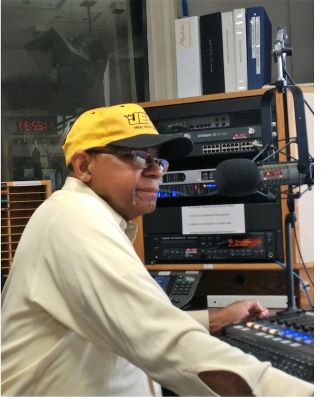
WESM’s Yancy Carrigan found his voice behind a radio microphone
Wednesday, November 11, 2020
Fifty years ago this past August, 1st Lt. Yancy Carrigan was on patrol in Vietnam when a flash caught his eye as he surveilled the thick jungle underbrush for signs of trouble.
Trouble found Carrigan in the form of a sniper’s bullet that entered the left side of his face at his lip, exited his neck and lodged in his right shoulder. He was the lone platoon member who “went down that day,” Aug. 18, 1970.
His tour of duty in a war that roiled America was over in just two months, but he has refused to let the experience define him.
Instead, the man behind the microphone weekday mornings at WESM, which features “jazz, blues and NPR news,” has drawn strength and joy from playing music and entertaining listeners for more than three decades.
His military service, Carrigan said, “is not something I usually bring up.”
“I’m OK with talking about it – if asked,” he said. “But I don’t go around volunteering a lot of information.”
What Carrigan did volunteer to do a year after the public radio station launched in 1987 was to sit in as an unpaid, on-air personality.
By 1995, he was hired to deliver his eclectic tastes in jazz, blues and gospel to Delmarva’s aficionados of those genres, making him today one of the region’s longest-running radio personalities.
Carrigan’s distinctive vocal stylings feature a soft, low-timbre cadence deliberately delivered in a way that can make first-time listeners pause.
After being shot, he spent the first six months of a 16-month rehabilitation stay at Walter Reed National Military Medical Center with his mouth wired shut. The day doctors took the wires out, he feasted on steak.

The next day, surgeons took a piece of bone from his hip and grafted it into his jaw, re-wiring his mouth shut another two months.
Carrigan remembers others with missing arms and legs and traumatic brain injuries. He thought himself lucky and determinedly learned how to speak again, even though he had lost a third of his tongue to the bullet wound.
The Salisbury native recovered to finish a four-year Reserve Officer Training Corps commitment he made when he enrolled at Morgan State College, then mustered out as a captain.
Carrigan applied to a handful of high-profile employers on the Lower Shore. The DuPont nylon plant in Seaford was the only one that offered him a job, one he held for some two decades before a corporate “downsizing.”
WESM’s Milton Blackman knew Carrigan played recorded music on weekends at a local American Legion home and approached him about showcasing his talents as a radio host.
“I’d never done anything like that,” Carrigan said. “I like music, and I figured ‘why not?’.”
Some three decades later, Carrigan is synonymous with WESM. He sticks to playing music and avoids dropping in personal commentary.
Of comments attributed to the incumbent president disparaging the military, especially those who died in service to the country, Carrigan simply says he tuned it out.
“That’s just him being him,” said Carrigan, who lost a brother-in-law and three Salisbury High School classmates in Vietnam. “I don’t differentiate from all the other stuff he’s said.”
His collection of compact discs numbers 3,000-to-4,000 — and about as many vinyl records, the latter he sometimes he taps to convert into digitized recordings for his shows. He never knows what he’s going to play for listeners; he just “goes with the flow … and the feeling I have that day.”
Carrigan celebrated his 74th birthday this past January and recently told WESM management he’ll end his four-day-a-week morning show just before Christmas, when the university goes on holiday break. (He’ll continue doing his two live Saturday shows – “Music from the Wax Museum” and “Blues Train.”)
“The reason I’m still working is I love what I do,” he said.
Behind a microphone afforded him a way to express his individualism.
“I never wanted to be like everybody. I wanted to be me,” Carrigan said. “I enjoy being me. I’ve always been me.”
Sounds like kernels of a jazz song, doesn’t it?

